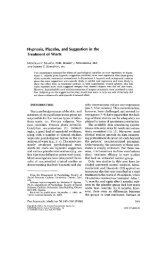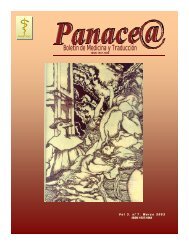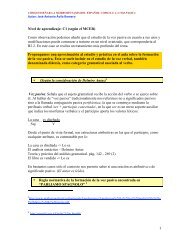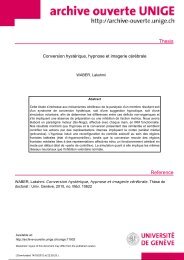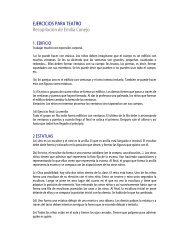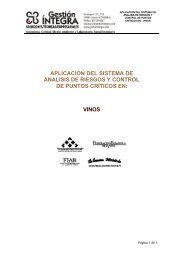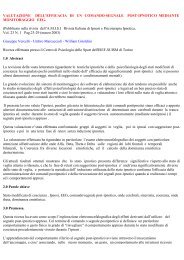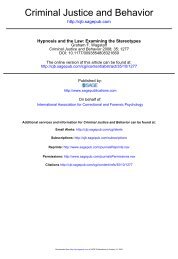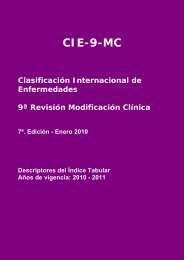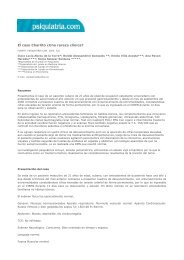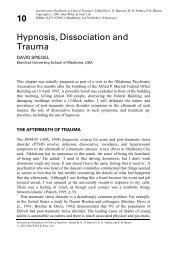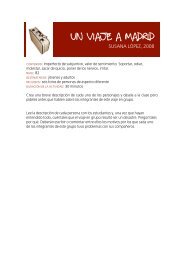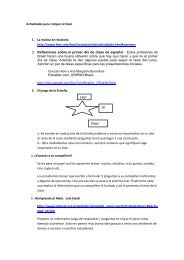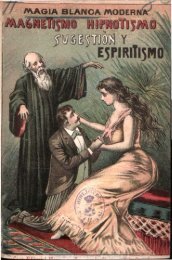Orne, M.T. The use and misuse of hypnosis in court. International ...
Orne, M.T. The use and misuse of hypnosis in court. International ...
Orne, M.T. The use and misuse of hypnosis in court. International ...
Create successful ePaper yourself
Turn your PDF publications into a flip-book with our unique Google optimized e-Paper software.
<strong>Orne</strong> 1979 IJCEHhttp://www.sas.upenn.edu/psych/history/orne/orneijceh19794311341.html9 de 23 19/03/2012 17:24communicated with be<strong>in</strong>gs from another galaxy. In such <strong>in</strong>stances, the sophisticated listener smiles aboutthe <strong>in</strong>dividual's assertions s<strong>in</strong>ce it is obvious that they represent pseudomemories. Unfortunately, if suchpseudomemories relate to events which occurred 6 months ago <strong>and</strong> are em<strong>in</strong>ently plausible, there is noway for either the hypnotist or the subject or a jury to dist<strong>in</strong>guish between them <strong>and</strong> actual recall <strong>of</strong> whatoccurred.<strong>The</strong> content <strong>of</strong> pseudomemories when they are witt<strong>in</strong>gly or unwitt<strong>in</strong>gly <strong>in</strong>duced dur<strong>in</strong>g <strong>hypnosis</strong> is, <strong>of</strong>course, not r<strong>and</strong>om. If someone has just seen a science fiction film, one can usually recognize elements <strong>of</strong>that film <strong>in</strong> his description <strong>of</strong> what is go<strong>in</strong>g on about him <strong>in</strong> the year 2000; similarly, if a witness ishypnotized <strong>and</strong> has factual <strong>in</strong>formation casually gleaned from newspapers or <strong>in</strong>advertent comments madedur<strong>in</strong>g prior <strong>in</strong>terrogation or <strong>in</strong> discussion with others who might have knowledge about the facts, many <strong>of</strong>these bits <strong>of</strong> knowledge will become <strong>in</strong>corporated <strong>and</strong> form the basis <strong>of</strong> any pseudomemories thatdevelop. Furthermore, if the hypnotist has beliefs about what actually occurred, it is exceed<strong>in</strong>gly difficultfor him to prevent himself from <strong>in</strong>advertently guid<strong>in</strong>g the subject's recall so that he will eventually"remember" what he, the hypnotist, believes actually happened.A simple experimental demonstration which I have <strong>of</strong>ten carried out is directly relevant to thecircumstances <strong>of</strong> attempts to hypnotically enhance recall. First, I carefully establish <strong>and</strong> verify that aparticular subject had <strong>in</strong> fact gone to bed at midnight on, say February 17, <strong>and</strong> had arisen at 8 a.m. thefollow<strong>in</strong>g morn<strong>in</strong>g. After <strong>in</strong>duc<strong>in</strong>g deep <strong>hypnosis</strong>, it is suggested that the subject relive the night <strong>of</strong>February 17 --gett<strong>in</strong>g ready for bed, turn<strong>in</strong>g out the light, <strong>and</strong> go<strong>in</strong>g to sleep at midnight. As the subjectrelives be<strong>in</strong>g asleep, he is told that it is now 4 a.m. <strong>and</strong> then is asked whether he has heard the two loudnoises. Follow<strong>in</strong>g this question (which is <strong>in</strong> fact a suggestion), a good subject typically responds that thenoises had awakened him. Now <strong>in</strong>structed to look around <strong>and</strong> check the323 USE AND MISUSE OF HYPNOSIS IN COURTtime, he may say it is exactly 4:06 a.m. If then asked what he is do<strong>in</strong>g, he may describe some activity suchas go<strong>in</strong>g to the w<strong>in</strong>dow to see what happened or wonder<strong>in</strong>g about the noises, forgett<strong>in</strong>g about them, <strong>and</strong>go<strong>in</strong>g back to sleep.Still hypnotized, he may relive wak<strong>in</strong>g up at 8 a.m. <strong>and</strong> describe his subsequent day. If, prior to be<strong>in</strong>gawakened, he is told he will be able to remember the events <strong>of</strong> February 17 as well as all the other th<strong>in</strong>gsthat happened to him <strong>in</strong> <strong>hypnosis</strong>, he readily confounds his hypnotic experience with his actual memoryon awaken<strong>in</strong>g. If asked about the night <strong>of</strong> February 17, he will describe go<strong>in</strong>g to sleep, <strong>and</strong> be<strong>in</strong>gawakened by two loud noises. If one <strong>in</strong>quires at what time these occurred, he will say, "Oh, yes, I lookedat my watch beside my bed. It has a radium dial. It was exactly 4:06 a.m …." <strong>The</strong> subject will beconv<strong>in</strong>ced that his description about February 17 is accurately reflect<strong>in</strong>g his orig<strong>in</strong>al memories.<strong>The</strong> subject's altered memory concern<strong>in</strong>g the night <strong>of</strong> February 17 will tend to persist (unless suggestionsare given to the contrary) particularly beca<strong>use</strong> the subject was asleep at the time <strong>and</strong> there are nocompet<strong>in</strong>g memories. <strong>The</strong> more frequently the subject reports the event, the more firmly established thepseudomemory will tend to become. In the experimental demonstration, we are deal<strong>in</strong>g with an essentiallytrivial memory about which the subject has no strong <strong>in</strong>herent motivations. Nonetheless, the memory iscreated by a lead<strong>in</strong>g question, which, however, on casual observation, seems <strong>in</strong>nocuous.In a life situation where <strong>hypnosis</strong> is <strong>use</strong>d to enhance recall, the same mechanisms which we havepurposively employed <strong>in</strong> the laboratory to create plausible pseudomemories which the subject accepts ashis own may easily occur <strong>in</strong>advertently. It must be emphasized that one is not usually deal<strong>in</strong>g with aconscious effort on the part <strong>of</strong> the hypnotist to distort a witness's memories; on the contrary, the processby which the hypnotized subject is affected typically occurs outside <strong>of</strong> the hypnotist's awareness. Thus, ifthe hypnotist knows that two shots have been fired at approximately 4 a.m. on the night <strong>of</strong> February 17,what seems more natural than to <strong>in</strong>quire <strong>of</strong> a witness whether he had heard any loud noises? Further, s<strong>in</strong>ceusually the witness also knows someth<strong>in</strong>g about the case <strong>and</strong> the k<strong>in</strong>ds <strong>of</strong> memories which would be



